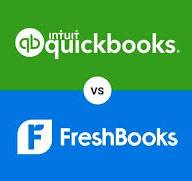Article
Quick Decisions: FreshBooks vs QuickBooks for Small Business Accounting
SmallBizCRM Staff – August 28th, 2025
 Choosing the right accounting software can feel like navigating a maze. For small business owners, freelancers, and service-based teams, your choice can either simplify your finances or create extra headaches. Two of the most popular options are FreshBooks and QuickBooks. Both promise to streamline accounting, invoicing, and expense tracking, but they cater to slightly different business needs. In this guide, we’ll break down the features, benefits, and key differences so you can make an informed choice.
Choosing the right accounting software can feel like navigating a maze. For small business owners, freelancers, and service-based teams, your choice can either simplify your finances or create extra headaches. Two of the most popular options are FreshBooks and QuickBooks. Both promise to streamline accounting, invoicing, and expense tracking, but they cater to slightly different business needs. In this guide, we’ll break down the features, benefits, and key differences so you can make an informed choice.
Why This Matters for Small Businesses
Small businesses often juggle multiple roles—managing clients, projects, and finances. Picking the wrong accounting tool can waste precious hours or lead to costly errors. A software solution that fits your workflow not only saves time but also provides clarity on cash flow, profit, and financial planning. With FreshBooks vs QuickBooks, understanding which software aligns with your business type is essential.
Introducing FreshBooks and QuickBooks
FreshBooks is a cloud-based accounting platform designed for freelancers, consultants, and small service businesses. It focuses on invoicing, time tracking, and expense management
, delivering an intuitive experience that minimizes the learning curve. Features like recurring invoices, late payment reminders, and simple reporting make it ideal for users who want efficiency without complexity.
QuickBooks, on the other hand, is a more comprehensive accounting suite suited for small to medium-sized businesses. Beyond invoicing, it handles payroll, tax management, bank reconciliation, and advanced reporting. QuickBooks scales with your business but may require a steeper learning curve compared to FreshBooks.
FreshBooks vs QuickBooks: Feature Comparison
1. Ease of Use
-
FreshBooks: Known for its clean interface and beginner-friendly workflow. Ideal for those new to accounting or who prefer simplicity.
-
QuickBooks: Offers more advanced tools and features, which can feel overwhelming initially but provides more power for growing businesses.
2. Invoicing & Billing
-
FreshBooks: Automates recurring invoices, tracks payment statuses, and sends friendly reminders for late payments.
-
QuickBooks: Highly customizable invoices, integrates invoicing with payroll and tax reports, and supports multiple currencies.
3. Expense Tracking
-
FreshBooks: Snap receipts with a mobile app and categorize expenses by project for better client billing.
-
QuickBooks: Comprehensive expense tracking, detailed categorization, and bank account reconciliation for full accounting control.
4. Time Tracking
-
FreshBooks: Built-in time tracking, ideal for billing clients by the hour.
-
QuickBooks: Requires QuickBooks Time or other integrations to track employee hours effectively.
5. Reporting & Analytics
-
FreshBooks: Generates simple cash flow, profit & loss, and expense reports. Perfect for small business owners needing a quick financial snapshot.
-
QuickBooks: Offers detailed reporting, including customizable statements, forecasts, and tax-ready summaries.
6. Integrations & Scalability
-
FreshBooks: Integrates with payment gateways, project management tools, and other apps small businesses commonly use.
-
QuickBooks: Extensive ecosystem of integrations, making it suitable for businesses that anticipate growth or need complex accounting workflows.
Who Will Benefit Most
-
FreshBooks: Freelancers, solo entrepreneurs, and small service teams who want to spend less time on accounting and more on clients.
-
QuickBooks: Small to medium businesses with complex accounting needs, multiple team members, and plans for scaling.
 Key Considerations When Choosing
Key Considerations When Choosing
-
Business Type: Are you a freelancer, a small team, or a growing business? FreshBooks leans toward the former, QuickBooks the latter.
-
Budget: FreshBooks is generally more cost-effective for solo users, while QuickBooks’ pricing grows with added features.
-
Accounting Complexity: Consider whether you need payroll, multi-currency support, and tax integration.
-
Integration Needs: Evaluate your existing tools (project management, CRM, eCommerce platforms) and how each software will connect.
Conclusion
 Both FreshBooks and QuickBooks excel in their niches. FreshBooks offers simplicity and
Both FreshBooks and QuickBooks excel in their niches. FreshBooks offers simplicity and speed, making it perfect for freelancers and small service businesses. QuickBooks delivers depth and scalability, ideal for growing businesses with more complex accounting needs. For many small business owners, the optimal solution could involve FreshBooks for day-to-day efficiency and QuickBooks for scaling operations. Understanding your current and future needs ensures you pick the right accounting partner and save valuable time.
speed, making it perfect for freelancers and small service businesses. QuickBooks delivers depth and scalability, ideal for growing businesses with more complex accounting needs. For many small business owners, the optimal solution could involve FreshBooks for day-to-day efficiency and QuickBooks for scaling operations. Understanding your current and future needs ensures you pick the right accounting partner and save valuable time.